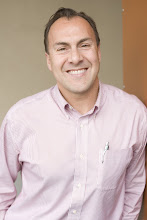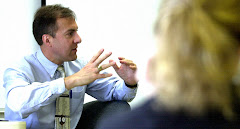My first 45 rpm record was "ABC" by the Jackson Five.
I walked down to Little's record store on Lake Street in Oak Park near the library, probably in the spring of 1970. And I went alone. This was a big moment.
Record stores in those days were a little like BestBuy's music department — but all confined to one little storefront. And nothing was electronic. It was paper and plastic (well, vinyl). There were rows and rows of bins with long play (L.P.) albums and singles stacked in them. They were organized alphabetically or by genre (rock, soul, country, gospel...) If I remember right, the top 40 singles were stacked on shelves behind the cash register. So the clerk just reached back, picked up "ABC" and put it in a bag for me.
Then, with adrenalin pumping (I wasn't a rich kid, so spending money I'd earned from a paper route felt huge) I plunked down the money and I walked out with my first single.
I was 10.
And to listen to that record, I had to figure out how to insert the thick insert onto the spindle of my parents' stereo unit in the dining room. I did figure it out. And that song was an anthem of my ten year-old world (well, one among a few others.)
Later I would learn that Jackson Five music was something somebody, probably in a high-rise office in New York, had labeled "bubble gum rock." No matter. This was music that grabbed my pre-adolescent mind and heart. I could relate to this kid Michael Jackson.
We were only two years apart (he was older.) And I imagined what it would be like to grow up in Gary, Indiana as he did with all those big brothers. And he was just so poised, so confident — or so it seemed.
Looking back now, given all the white-flight happening in Oak Park at the time, I'm surprised it didn't matter that he was black. I think I hardly noticed.
In my neighborhood, it was all about rep. And rep was partly what you looked like, but mostly about what you could do — usually on the playground in sports or fighting (or both). I wasn't much good at either. But I imagined that Michael Jackson could probably punch out most people on his playground, if called upon; and he could probably get on base when tossed in the schoolyard lineup, or run as fast or faster than anyone in his gym class.
And he could sing.
I could do that, and loved it — though nobody at school knew. Guys didn't do that in my elementary school. But Michael Jackson was lead singer for this group that just had something about it I loved. That made him someone worthy of my respect.
What bothered me a little, back then, was that I didn't see anything in Michael or his brothers that told me they knew God was the real meaning behind the joy and hope in life that I knew was foundational. For a ten year-old, I didn't know much theology, but I knew God was there — and I sensed He was bigger than anything, anywhere.
How could someone who looked, on TV anyway, like he was having so much fun, not know the importance of God in the world? It was a question I pondered then, and that's been on the back burner ever since — with Michael, with others in the entertainment industries.
It's a question I come back to again as I ponder Michael's departure. Did he kill himself? Did he just get sloppy with the meds he took, apparently, to the edge of excess?
People who knew him were saddened but not surprised by the news he'd gone. Comparisons with Elvis crop up often because, well, they're inevitable. There are so many parallels. But I think they're superficial comparisons. Michael was not Elvis.
Journalists will give us the toxicology results in the next few weeks. And someone will tell the world, hopefully through a scrupulous journalist, what was going through Michael's mind in the days and hours before he closed his eyes the last time.
There's a whole generation of kids like me who grew up on Michael's music who need to know the whole story (though I'm staying away from the macabre coverage.)
I'm not out sitting by his star in the sidewalk, but I am grieving. It's like he was a friend. There's something about celebrities and the psychology of fans that creates a false connection. I know all that; I know it's ridiculous. But I feel it anyway.
And what's tragic to me is that, from what I've read, Michael Jackson was a man searching for God's love. He had about him a sense of spiritual journey. Did somebody take the time to sit down with Michael Jackson and tell him how he could have real peace — right there in his world?
Fame, it's said, has a way of leaving the famous isolated and empty. Of course. He never really knew his Dad. That's part of it, too.
But more than that, this was a man who had no one to whom he could turn for real understanding. So he turned inward. And that's a lonely, potentially scary place.
And it hits home to me because I'm still only two years younger than this kid I met in 1970 and whose record I bought at that little store on Lake Street.
I haven't known fame much. Journalism faculty don't get it a lot.
But I've worked as a journalist. And I've observed fame and how it affects people.
Fame is a narcotic, a vapor, a dream. It's a pre-packaged, plastic thing that can be made — under the right lighting, with the other special effects pumped in — to appear supernaturally powerful.
But like vapors and dreams, fame is temporary. And like a narcotic, fame will, over time get in the blood stream and cause damage that's irreversible.
We're not here for fame. Jesus Christ, the only man who can be called truly famous in an eternal sense, was not driven by fame. He held it at arm's length.
And in the end, he left to others the telling of His story. It was better that way.
Yet the enduring power of Christ is that He was the real thing. Everything He claimed to be, actually was. Everything He promised, He did.
I wish Michael Jackson had learned this — about fame, about himself, about what he was and what he could do. I wish he'd met Christ. How different things could have been.
My prayer now is that those who are Michael's peers in the entertainment industry find God in ways that reach into their souls — right there in New York, in L.A., in Nashville, in Chicago. I pray, too, that those who have watched his tragic life as fans (the tens of thousands worldwide, and those of my generation who sense a bond with him) will, with God's prompting, sense they don't have to go the way he did.
There is hope. And it's not in the studio or on the concert stage.
It's in that quiet place, before God, with our arms open wide. Accepting His embrace.
Saturday, June 27, 2009
Subscribe to:
Posts (Atom)

